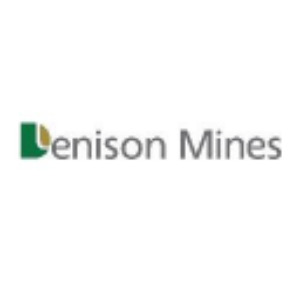Denison Announces Discovery of Additional High-Grade Mineralization at Gryphon and Reports Results from Successful Delineation Program
Rhea-AI Summary
Denison Mines (NYSE:DNN) has announced the discovery of additional high-grade uranium mineralization at its Gryphon deposit, located approximately 3 km northwest of the Company's Phoenix ISR uranium project. A significant intersection in drill hole WR-837AD2 revealed 2.3 metres at 1.69% eU3O8, including 0.5 metres at 5.48% eU3O8, approximately 40 metres outside the previously defined D1 lens.
The discovery was part of a successful 12,500-metre delineation program completed in the first half of 2025. The Gryphon deposit contains Indicated Mineral Resources of 61.9 million pounds U3O8 at an average grade of 1.7%. The project demonstrates robust economics with an estimated after-tax NPV of $864.2 million and an IRR of 37.6%, with competitive cash operating costs of USD$12.75/lb U3O8.
Positive
- Discovery of new high-grade uranium mineralization extending 40 metres beyond previous estimates
- Successful delineation program confirming geological model and grade expectations
- Robust economics with after-tax NPV of $864.2M and 37.6% IRR
- Competitive cash operating costs of USD$12.75/lb U3O8
- Significant resource base of 61.9M pounds U3O8 at 1.7% grade
Negative
- High initial capital costs requirement of CAD$737.4 million
- Project still requires additional drilling to define expansion potential
News Market Reaction
On the day this news was published, DNN gained 8.56%, reflecting a notable positive market reaction. Argus tracked a peak move of +8.7% during that session. Our momentum scanner triggered 16 alerts that day, indicating notable trading interest and price volatility. This price movement added approximately $149M to the company's valuation, bringing the market cap to $1.90B at that time.
Data tracked by StockTitan Argus on the day of publication.
The discovery was made as part of a highly successful delineation drill program carried out at Gryphon during the first half of 2025. Results from the delineation drilling are expected to add confidence to the previously estimated mineral resources for Gryphon, having confirmed the current geological interpretation of the deposit and intersecting uranium grades in line with expected values.
Denison's President and CEO, David Cates, commented, "Our 2025 Gryphon delineation program was highly successful and achieved each of the program's key objectives – including (a) increasing the density of drill testing within the A1 high-grade domain and confirming the geological model, (b) collecting additional geotechnical, metallurgical and hydrogeological samples and information to support future project evaluation efforts, and (c) initial testing of areas identified for possible expansion of mineral resources that are outside of the mine design outlined in the 2023 Pre-Feasibility Study ("PFS").
The delineation results demonstrate that Gryphon is an excellent high-grade basement-hosted uranium deposit that justifies further project development evaluation and de-risking. With a focus on confirming the mineralization in the A-series of lenses, a limited number of drill holes were designed to test for possible expansion of the estimated mineral resource. As a result, we are excited that drill hole WR-837AD2 encountered high-grade mineralization outside of the existing mineralized domain in an area that remains wide open for further expansion down-plunge and along strike. We are currently developing plans to follow-up this result and test other expansion targets."
Gryphon Uranium Deposit
Gryphon was discovered by Denison in 2014 and is estimated to contain Indicated Mineral Resources of 61.9 million pounds U3O8 (1,643,000 tonnes an average grade of
Gryphon is comprised of 24 primarily basement-hosted stacked lenses referred to as the A-series, B-series, C-series, D-series and E-series lenses, which are interpreted to be stacked to form a zone of mineralization measuring approximately 280 metres long by 113 metres wide, with each lens having variable thicknesses and generally plunging to the northeast and dipping to the southeast (See Figure 2). Four high-grade domains have been established within the A1 and D1 lenses. The A1 high-grade domain represents
Potential future development of the Gryphon deposit has been assessed as an underground mining operation at a PFS level in 2018 with a cost update completed in 2023. The outcomes of the study highlight robust economics with an estimated after-tax base-case Net Present Value ("NPV") of
Discovery of Additional High-Grade Mineralization Associated with the D1 lens
The D series lenses were targeted for potential mineral resource expansion in 2025 given their high-grade, structurally controlled nature, and that previous drilling left the mineralization partially open in the down-plunge and along-strike directions. Prior to this program, no significant expansion drilling has occurred proximal to Gryphon since 2018.
The last drill hole of the 2025 program (WR-837AD2) encountered high-grade uranium mineralization, which is interpreted to expand the extent of the D1 zone by ~40 metres in the down-plunge direction. This drill hole tested a 100-metre gap in the previous drill hole spacing (see Figure 3) and justifies further follow-up drilling to test to additional down-plunge extension as well as the potential for along strike continuation. Drill hole WR-836 was also completed in the expansion area and also encountered notable uranium mineralization, which indicates the system is open along strike to the north.
Denison reports its initial drilling results as radiometric equivalent uranium ("%eU3O8") from a calibrated, triple gamma, down-hole probe. All mineralized intersections have been sampled for chemical U3O8 assay and final results will be compiled following receipt of the data.
Table 1: Drill hole intercepts by lens for WR-836 and WR-837AD2.1
Drill Hole | Lens | From | To | Length | %eU3O82 |
WR-8361 | D13 | 800.3 | 800.8 | 0.5 | 0.40 |
WR-837AD21 | D13 | 834.6 | 836.9 | 2.3 | 1.69 |
(includes)4 | 835.6 | 836.1 | 0.5 | 5.48 |
Notes: | |
1. | Drill hole orientation (azimuth/dip) for WR-836 is 306.8o/-73.4o and for WR-837AD2 is 311.1o/-71.0o |
2. | eU3O8 is radiometric equivalent uranium from a calibrated total gamma down-hole probe. All intersections have been sampled for chemical U3O8 assay |
3. | Intersection interval is composited above a cut-off grade of |
4. | Intersection interval is composited above a cut-off grade of |
5. | As most of the drill holes are oriented steeply toward the northwest and the basement mineralization is interpreted to dip moderately to the southeast, the true thickness of the mineralization is expected to be approximately |
2025 Delineation Drill Program Highlights
A total of ~12,500 metres of diamond drilling was completed in seventeen drill holes and multiple off cuts during the 2025 delineation program at Gryphon. Overall, the delineation program confirmed the current geological interpretation of the deposit and supported the grade-thickness (GT) assumptions in the resource block model.
The A1 lens was the primary focus of the drill program as the high-grade and low-grade domains contain approximately
The B and C series lenses are located below the A series within the center of the deposit and were also intersected as part of the 2025 delineation program. Together the B and C series lenses account for approximately
Several drill holes encountered significant results, demonstrating the high-grade nature of Gryphon, including the following results from WR-831D1D2, which tested the primary lenses and returned the best mineralized intercepts from the delineation program:
Table 2: Drill hole intercepts by lens for WR-831D1D2.1
Lens | From | To | Length | %eU3O82 |
A43 | 655.6 | 657.3 | 1.7 | 0.87 |
A33 | 664.9 | 667.3 | 2.4 | 0.20 |
A23 | 682.5 | 684.3 | 1.8 | 0.76 |
A13 | 689.3 | 700.3 | 11.0 | 1.76 |
(includes)4 | 692.6 | 694.4 | 1.8 | 3.85 |
(includes)4 | 695.3 | 697.2 | 1.9 | 5.28 |
B13 | 701.2 | 708.0 | 6.8 | 0.13 |
B23 | 713.0 | 717.4 | 4.4 | 0.14 |
B33 | 721.0 | 735.5 | 14.5 | 2.13 |
(includes)4 | 723.9 | 725.7 | 1.8 | 6.38 |
(includes)4 | 727.1 | 727.6 | 0.5 | 2.60 |
(includes)4 | 731.5 | 734.0 | 2.5 | 6.16 |
B3 (continued)3 | 737.5 | 743.8 | 6.3 | 0.91 |
(includes)4 | 740.1 | 740.7 | 0.6 | 3.42 |
Notes: | |
1. | Drill hole orientation (azimuth/dip) 295.8o/-77.0o |
2. | eU3O8 is radiometric equivalent uranium from a calibrated total gamma down-hole probe. All intersections have been sampled for chemical U3O8 assay |
3. | Intersection interval is composited above a cut-off grade of |
4. | Intersection interval is composited above a cut-off grade of |
5. | Intersections with less than 0.5 GT were left out of the table to simplify the results |
6. | As most of the drill holes are oriented steeply toward the northwest and the basement mineralization is interpreted to dip moderately to the southeast, the true thickness of the mineralization is expected to be approximately |
Additional Data Collected for Future De-risking and Study Work
Approximately 250 kg of whole-core samples were collected for metallurgical test work. Metallurgical test programs are being developed to assess uranium recoveries to advance the evaluation work completed to support the 2018 and 2023 PFS.
Geotechnical logging was completed on all drill holes and hydrogeological information was collected from two of the drill holes which were outfitted with vibrating wire piezometers (VWPs). The information collected from these exercises is expected to increase the understanding of different hydrogeological zones to support future mine-design planning.
This work adds to the extensive database of geological, hydrogeological, geotechnical, and metallurgical data for Gryphon. This site-specific data is expected to be used to validate certain key assumptions in potential future technical studies further evaluating the Gryphon deposit for underground mining.
About Wheeler River
Wheeler River is the largest undeveloped uranium project in the infrastructure-rich eastern portion of the
Based on the respective studies, both deposits have the potential to be competitive with the lowest cost uranium mining operations in the world. Permitting efforts for the planned Phoenix ISR operation commenced in 2019 and several notable milestones were achieved in 2024 with the submission of federal licensing documents and the acceptance of the final form of the project's Environmental Impact Statement by the Province of
About Denison
Denison is a uranium mining, exploration and development company with interests focused in the
Additionally, through its
In 2024, Denison celebrated its 70th year in uranium mining, exploration, and development, which began in 1954 with Denison's first acquisition of mining claims in the
Qualified Persons
The technical information contained in this press release has been reviewed and approved by Chad Sorba, P.Geo., Denison's Vice President Technical Services & Project Evaluation, who is a Qualified Persons in accordance with the requirements of NI 43-101.
Cautionary Statement Regarding Forward-Looking Statements
Certain information contained in this news release constitutes 'forward-looking information', within the meaning of the applicable
In particular, this news release contains forward-looking information pertaining to the following: scope, objectives and interpreted results of the Gryphon delineation program; future plans, including potential future exploration potential and metallurgical test programs; and expectations regarding its joint venture ownership interests and the continuity of its agreements with its partners and third parties. Statements relating to 'mineral reserves' or 'mineral resources' are deemed to be forward-looking information, as they involve the implied assessment, based on certain estimates and assumptions that the mineral reserves and mineral resources described can be profitably produced in the future.
Forward looking statements are based on the opinions and estimates of management as of the date such statements are made, and they are subject to known and unknown risks, uncertainties and other factors that may cause the actual results, level of activity, performance or achievements of Denison to be materially different from those expressed or implied by such forward-looking statements. For example, the modelling and assumptions upon which the plans for Wheeler River are based may not be maintained after further work is completed. In addition, Denison may decide or otherwise be required to discontinue testing, evaluation and other work if it is unable to maintain or otherwise secure the necessary resources (such as testing facilities, capital funding, regulatory approvals, etc.). Denison believes that the expectations reflected in this forward-looking information are reasonable but no assurance can be given that these expectations will prove to be accurate and results may differ materially from those anticipated in this forward-looking information. For a discussion in respect of risks and other factors that could influence forward-looking events, please refer to the factors discussed in Denison's Annual Information Form dated March 28, 2025 or subsequent quarterly financial reports under the heading 'Risk Factors'. These factors are not, and should not be construed as being exhaustive.
Accordingly, readers should not place undue reliance on forward-looking statements. The forward-looking information contained in this news release is expressly qualified by this cautionary statement. Any forward-looking information and the assumptions made with respect thereto speaks only as of the date of this news release. Denison does not undertake any obligation to publicly update or revise any forward-looking information after the date of this news release to conform such information to actual results or to changes in Denison's expectations except as otherwise required by applicable legislation
![]() View original content to download multimedia:https://www.prnewswire.com/news-releases/denison-announces-discovery-of-additional-high-grade-mineralization-at-gryphon-and-reports-results-from-successful-delineation-program-302506529.html
View original content to download multimedia:https://www.prnewswire.com/news-releases/denison-announces-discovery-of-additional-high-grade-mineralization-at-gryphon-and-reports-results-from-successful-delineation-program-302506529.html
SOURCE Denison Mines Corp.







